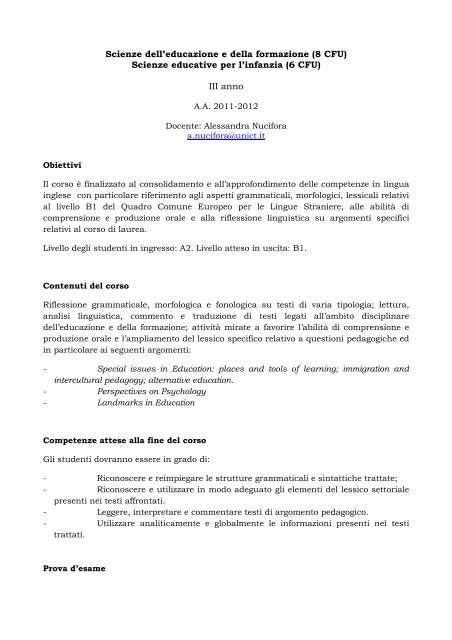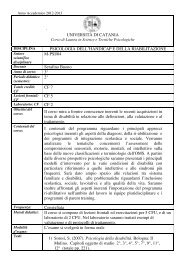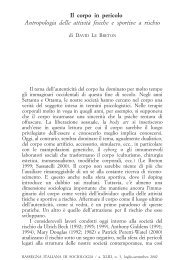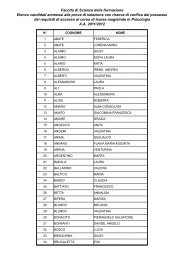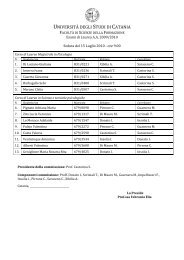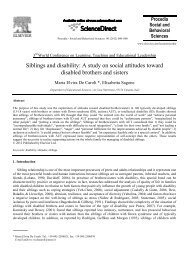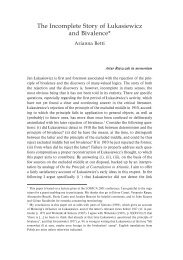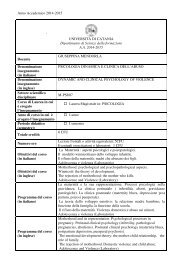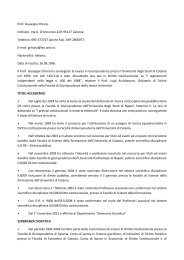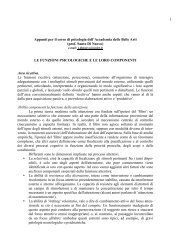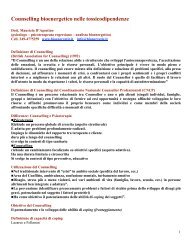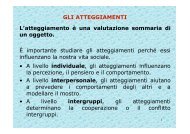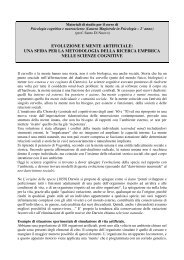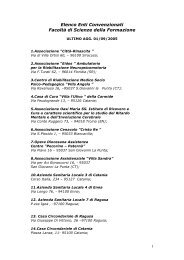Lingua inglese - Scienze della Formazione
Lingua inglese - Scienze della Formazione
Lingua inglese - Scienze della Formazione
Create successful ePaper yourself
Turn your PDF publications into a flip-book with our unique Google optimized e-Paper software.
<strong>Scienze</strong> dell’educazione e <strong>della</strong> formazione (8 CFU)<strong>Scienze</strong> educative per l’infanzia (6 CFU)III annoA.A. 2011-2012Docente: Alessandra Nuciforaa.nucifora@unict.itObiettiviIl corso è finalizzato al consolidamento e all’approfondimento delle competenze in lingua<strong>inglese</strong> con particolare riferimento agli aspetti grammaticali, morfologici, lessicali relativial livello B1 del Quadro Comune Europeo per le Lingue Straniere, alle abilità dicomprensione e produzione orale e alla riflessione linguistica su argomenti specificirelativi al corso di laurea.Livello degli studenti in ingresso: A2. Livello atteso in uscita: B1.Contenuti del corsoRiflessione grammaticale, morfologica e fonologica su testi di varia tipologia; lettura,analisi linguistica, commento e traduzione di testi legati all’ambito disciplinaredell’educazione e <strong>della</strong> formazione; attività mirate a favorire l’abilità di comprensione eproduzione orale e l’ampliamento del lessico specifico relativo a questioni pedagogiche edin particolare ai seguenti argomenti:- Special issues in Education: places and tools of learning; immigration andintercultural pedagogy; alternative education.- Perspectives on Psychology- Landmarks in EducationCompetenze attese alla fine del corsoGli studenti dovranno essere in grado di:- Riconoscere e reimpiegare le strutture grammaticali e sintattiche trattate;- Riconoscere e utilizzare in modo adeguato gli elementi del lessico settorialepresenti nei testi affrontati.- Leggere, interpretare e commentare testi di argomento pedagogico.- Utilizzare analiticamente e globalmente le informazioni presenti nei testitrattati.Prova d’esame
L’esame si articola in una prova scritta e una prova orale. La prova scritta consiste in untest per la verifica <strong>della</strong> competenza grammaticale e in una traduzione. Lo studente chenon supera la prova scritta non può sostenere la prova orale. La prova orale si basa suuna conversazione in lingua <strong>inglese</strong>, sulla discussione dei testi affrontati durante lelezioni nonché sul commento <strong>della</strong> prova scritta.TestiParte generale:– M. Swan, C. Walter, D. Bertocchi, The Good Grammar Book for ItalianStudents, Oxford U.P., 2007 (grammatica di riferimento per consultazione)– M. Hancock, A. McDonald, English Result, Pre-Intermediate, Oxford U. P., 2008Parte specifica:- S. Notini, H. Monaco, Issues in Education, Clueb, Bologna 2001 (pp. 61-113,limitatamente ai brani affrontati durante le lezioni) per gli studenti di entrambi icorsi di laurea (8 CFU/6 CFU).- R. Facchinetti, Anna Belladelli, English for Educators, Cedam, Milano 2011Per gli studenti di <strong>Scienze</strong> dell’Educazione e <strong>della</strong> <strong>Formazione</strong> (8 CFU): units 1.Sigmund Freud; 3. Lev Vygotsky, 5. Jerome S. Bruner; 13; John Dewey; 15.Paulo Freire; 17. bell hooks (totale pp. 30)Per gli studenti di <strong>Scienze</strong> educative dell’infanzia (6 CFU): units 1. SigmundFreud; 3. Lev Vygotsky; 5. Jerome S. Bruner (totale pp. 15)
B. A. course in Education (8 credit – 48 hours)B. A. course in Children Education (6 credits – 36 hours)IIIrd YearAcademic Year 2011-2012Alessandra NuciforaEmail: a.nucifora@unict.itObjectivesThe course aims at consolidating and deepening students’ linguistic skills particularlyconcerning the grammatical, morphological and phonological aspects of language (B1level of the Common European Framework), the ability of reading comprehension and thecomment on specialized texts belonging to the fields of education and pedagogy.ContentsGrammatical, morphological and phonological analysis of texts of different typologies;reading comprehension activities with a focus on scientific lexicon on Education andparticularly on the following topics:- Special issues in Education: places and tools of learning; immigration andintercultural pedagogy; alternative education; technology and Education.- Perspectives on Psychology- Landmarks in EducationLearning outcomesBy the end of the course students will be able to:- Identify and properly use the grammatical and syntactical structures dealtwith during lessons.- Recognize and properly use the most frequently recurring elements ofspecialized lexicon.- Read, translate and comment on texts about education and pedagogy.- Sum up information found in texts.Entry level: A2; achievement level: B1.ExamTesting will be based on a written test and an oral exam. The written test assessesgrammar skills. Students who fail the written test cannot be admitted to the oral one.
The oral exam is based on a conversation in English language, on the revision of thewritten test and on the comment on the reading passages dealt with during lessons.Course-booksGrammar and language skills:– M. Swan, C. Walter, D. Bertocchi, The Good Grammar Book for ItalianStudents, Oxford U.P., 2007 (reference grammar)– M. Hancock, A. McDonald, English Result, Pre-Intermediate, Oxford, 2008Monographic course:- S. Notini, H. Monaco, Issues in Education, Clueb, Bologna 2001 (pp. 61-113,selected reading passages) for both students of Education and ChildrenEducation.- R. Facchinetti, Anna Belladelli, English for Educators, Cedam, Milano 2011.For the students belonging to the B. A. course in Education (8 CFU): units 1.Sigmund Freud; 3. Lev Vygotsky, 5. Jerome S. Bruner; 13; John Dewey; 15.Paulo Freire; 17. bell hooks (30 pages)For the students belonging to the B. A. course in Children Education (6 CFU):units 1. Sigmund Freud; 3. Lev Vygotsky, 5. Jerome S. Bruner (15 pages)


